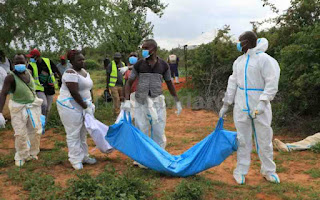Standard
May 17, 2023
In the wake of Shakahola deaths suspected to be linked to cultism, the question of whether or not to impose stricter regulations on churches has generated heat in the court of public opinion.
Some churches have been accused of brainwashing and manipulating innocent, desperate congregants including children. Others are now suspected of being tax havens and money laundering schemes for unscrupulous thieves and fraudsters.
In the heat of the debate, the government now finds itself in an awkward position, with a number of critics feeling that the State is plotting to use Shakahola tragedy as a disguise to interfere in the operations of churches in violation of Article 32 of the Constitution of Kenya that provides for the freedom of religion, thought, belief and opinion.
Sub-article 2 of the same article protects individuals and communities who manifest any religion, belief through worship, practice including observance of any practice and or day.
As such, the Constitution never envisioned a situation where preachers would be dragged to court for their sermons. Today anyone can be blaspheming against God and get away with it. The assumption is that God himself will try such a man in the life after.
This is the headache facing Kenya today in the wake of the sad events at Shakahola where the body count at a place that few Kenyans knew until April of 2023 is rising every day. Granted-these men, women and children may be unfortunate victims of blind faith. Which begs the question, is it illegal to have faith in something and be ready to die for a cause?
There are some who will argue that the question of right or wrong is not for us to judge; and that we cannot determine whether the people suspected of dying for their faith were worshiping the real God or not; or even whether they met the God they believed they were dying for.
But it all boils down to one big headache for the government - at what point should the State come in and regulate religion, when on the same ink and paper - the Constitution protects the right to conscience and religion?
At what point should the government come to the rescue of people that declared theirs a secular state? To what extent should religious leaders be criminally culpable for the deaths or injury of their followers?
No freedom is absolute, including the freedom of religion. The right to manifest belief may be subject to such limitations as maybe prescribed by law and are necessary in a democratic society in the interests of public safety, for the protection of public order, health or morals, or for the protection of the rights and freedoms of others.
But the world over, these limitations, in some cases come face to face with the freedom of choice; the defence of consent. In New Zealand for example, the case of R versus Lee brought to the fore [the] issue of consensual self-harm and exorcism.
Lee was a Korean national living in New Zealand who founded a church he called Lord of All at a time when the gospel of exorcism and deliverance was rife.
There were between 15 between and 20 members in Lee's Church, most of them Korean. Seven of the church members lived in Lee's home. One of them, Joanna Lee who suffered from vitiligo, a disease characterised by discolouration of the skin.
When Joanna experienced low mood and persistent negative feelings, she and Lee attributed this to demonic possession and prescribed exorcism.
The exorcism process took place over a number of hours and involved Lee and other church members applying pressure on Joanna's neck, chest, stomach and face, sitting, lying and bouncing on her. When Joanna shouted at them to stop, they assumed that it was the devil rather than Joanna talking.
At the end of the process Lee told his followers that Joanna was cured and fallen into blissful sleep. In reality, she was dead. Still, church members watched over her body for the next six days, washing her body with alcohol in the hope that she would wake up.
Eventually, a visitor came to the house and alerted the police.
Lee tried to convince police that Joanna was 'regenerating' and would come back to life. The police would hear none of it, and he was arrested and convicted for manslaughter.
During the hearing, witnesses painted a picture of a meek, compliant and self-sacrificing woman. Who was also emotionally vulnerable, given her medical issues and the fact that she had only arrived in New Zealand from Korea a few weeks before the exorcism.
In an appeal case that followed, the jury returned with the verdict that the defence of consent would stand unless there were public policy reasons not to make the defence suffice; that there was no suggestion that Joanna might have lacked legal capacity to make decisions.
Back home in Kenya there has not been a proper authority on consent to self-harm. While common law has weighed into the matter, the jury is still out on whether consent to self-harm a proper defence is or not.
Still, something needs to be done urgently in the wake of Shakahola deaths. For starters, we need to insist that all religious leaders undertake theology courses.
Religious institutions, including churches, should not be private or personal establishments. Instead they should be public, set up to benefit all members of society under the laws of land.
Those that do any other business besides preaching ought to either pay taxes to the government or separate the business entities from the churches they run.
https://www.standardmedia.co.ke/article/2001473119/to-regulate-churches-or-not-the-big-question-after-cult-deaths


No comments:
Post a Comment